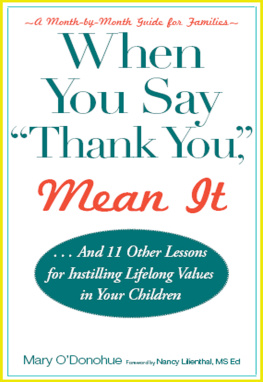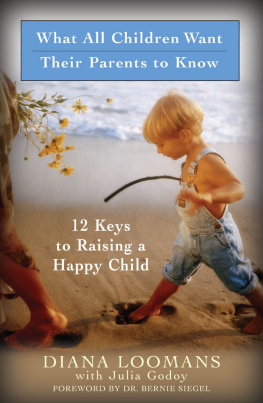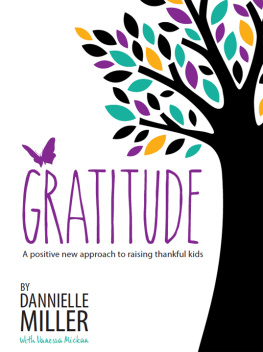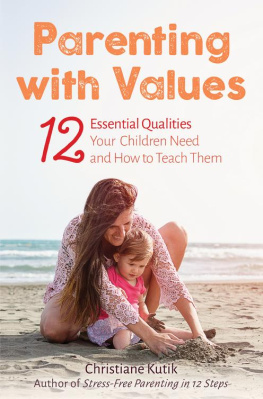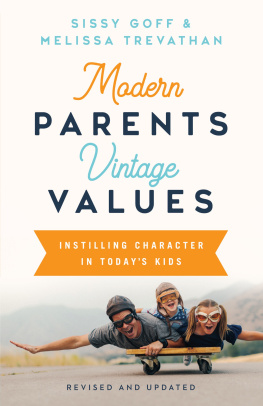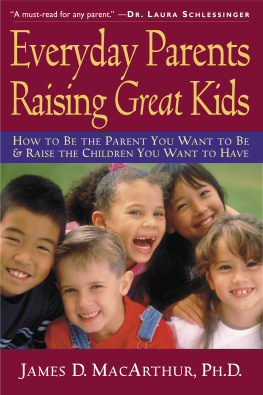When
You Say
Thank You,
Mean It
... And 11 Other
Lessons for Instilling Lifelong
Values in Your Children
Mary ODonohue
Foreword by Nancy Lilienthal, MS Ed

Copyright 2010 by Mary ODonohue
All rights reserved.
This book, or parts thereof, may not be reproduced in any
form without permission from the publisher; exceptions are
made for brief excerpts used in published reviews.
Published by Adams Media, an imprint of Simon & Schuster, Inc.
57 Littlefield Street, Avon, MA 02322. U.S.A.
www.adamsmedia.com
ISBN 10: 1-4405-0377-X
ISBN 13: 978-1-4405-0377-1
eISBN 10: 1-4405-0874-7
eISBN 13: 978-1-4405-0874-5
Printed in the United States of America.
10 9 8 7 6 5 4 3 2 1
Library of Congress Cataloging-in-Publication Data
is available from the publisher.
This publication is designed to provide accurate and authoritative information with regard to the subject matter covered. It is sold with the understanding that the publisher is not engaged in rendering legal, accounting, or other professional advice. If legal advice or other expert assistance is required, the services of a competent professional person should be sought.
From a Declaration of Principles jointly adopted by a
Committee of the American Bar Association and
a Committee of Publishers and Associations
This book is available at quantity discounts for bulk purchases.
For information, please call 1-800-289-0963.
dedication
To Jim, Connor, and Grace, with infinite gratitude
Live your beliefsand you can turn theworld around.
~Henry David Thoreau
Contents
foreword
As the director of a preschool in Manhattan, and an educator with thirty years of experience, it has been a continual source of joy to me throughout my professional career to watch young children start to explore the world around them. In the rapid development of these first few years, everything is new and exciting for them as they learn to interact with their world and their fellow human beings. As a parent, I have also experienced firsthand the pleasures and challenges of helping my own daughter and son grow to become caring, responsible adults who make me proud every day.
Thats every parents wish. But many parents dont realize that morals are not something that spring naturally from human beings. In other words, children will not simply absorb your moral character if you dont take the time to talk with them and teach them right from wrong.
Jean Piaget, the Swiss psychologist who devoted his career to the study of children and how they learn, would tell you that children are not born with values. An infants entire focus is on the need to survive. If they are hungry, their energy goes to letting someone know and getting fed. Their brains are not capable of taking in the needs of others. Around the age of two or three, however, that begins to change and the world around them becomes very interesting. With this interest come challenges that are new to the child. New questions arise, such as How do I get what I want but also make my friend or parent happy? Sometimes young children will revert to those egocentric ways, but more and more what is happening around them becomes important to them. This is the moment for parents or other adults who share their lives to start to guide. Certainly, setting an example for the child is essential, both by how the adult treats the children and others around them. From my experience, I know that adults must show respect not only to the child, but also to those around them. A teacher who shows great respect to the children but is disrespectful to co-teachers does not set a good example and children are very perceptive.
You show respect to children when you let them know you care about them, and care about what they think and how they feel. But beginning this process of learning values with young children also requires additional help from adults. Sometimes children cannot find the words they need to tell their peers how they feel. Here an adult can step in and help (without taking over) the children to discover a way to work it out that is considerate of everyone.
But what about older children who have the abilities but still need help? Setting examples is a great start, but it is not enough. Just as children learn about history and science, they need to learn about values. They must be challenged to think about the whys, hows, whens, and wheres of values. When younger, they thought about how to get what they wanted and how to please others; now they have to learn to think of more abstract ideas, such as, What does it mean to me and others when I show compassion? What is important to me? How should I behave toward others? We do not want children to follow values solely because adults tell them to, but because these values are part of who they are.
In this book, Mary ODonohue has set out a process for helping your family take an indepth look at the important values in your own life. This process has given Mary and her husband the chance to focus attention on what is important to them and why, and she has found a way for other families to do the same. Mary and her husband started their children on this program when each of them was five, which is the youngest age children can truly learn from these exercises. Mary has provided many variations in her monthly exercises so that any family can focus on the values that are most important to them in a way that works for them. She provides the blueprint to know how to break down those values so that children will truly understand them. The more involved the children are, not only in the exercises but also in the planning, the more they will be able to internalize the values.
There are opportunities everywhere that provide openings for a conversation with your child about values. Take every moment you can to talk to your child about how you feel about things. Challenge them to reach down within themselves and talk about how they feel and, if action needs to happen, how they can go about doing that.
When my children were young and growing up in New York City, many homeless people lived on the streets in our neighborhood. Instead of rushing past without taking notice, we often talked about how these people had become homeless and how we could help. We could not give money to everyone who asked, but we could collect coats and clothing that we could give to organizations that could help them. We also talked about how they still deserved our respect even if their lives were very different. Taking the time in our day to talk about it made the issue important.
In our overcrowded world, people are constantly interacting with each other. With the Internet, even people who are isolated physically can still be in constant contact with others. How are we all going to get along? Maybe we can all help a little by taking the time to pass on to our children those values that have made us better people, better citizens, and better members of the human race.
Nancy Lilienthal, MS Ed,
Director of 43rd Street Kids Preschool
introduction
As a parent, Im sure youve had a moment (or two) when you wonder if youre teaching your children values in a way thats actually getting through to them. I know I have. The one that sticks with me most was when my son Connor was about five years old and he received a gift from a friend of mine. She had found a blue-patterned T-shirt she thought he would like, and presented it to him wrapped in cheerful paper with a colorful ribbon. When my son tore open the gift and saw the T-shirt, he was clearly disappointed. Apparently, he had hoped it might be a toy or game. Connor carelessly dropped the shirt on the floor and started to walk out of the room, stepping over strips of wrapping paper as he went. I remember saying the all too familiar Hey... what do you say? and he had replied with a lackluster,
Next page
